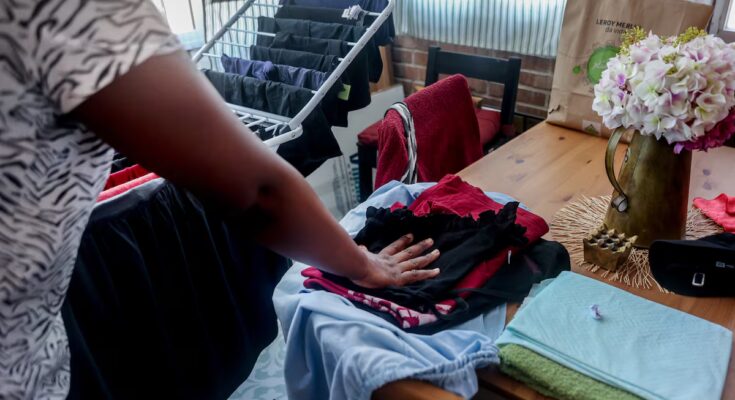Domestic workers carry out their work in private homes. They are not work centers where employees can organize themselves, nor public spaces visible to customers. This private aspect causes a deficit in the prevention of professional risks. What is required on a construction site, in a factory, in an office or in a shop does not apply in the spaces where these professionals work, a situation that will change this Friday 14 November. Since then, employers of these services are required to assess occupational risks in their homes, a new right for the professional group with the worst pay in the economy, the highest percentage of foreigners and also the most feminized.
This Friday 14 November six months have passed since the Ministry of Labor launched the prevention10.es website. This is the “free and open access prevention tool” which, as the Ministry explained in its launch, “allows employers to comply with their new legal obligations”. That is, on this site people who hire domestic workers can complete the self-assessment of occupational risks in their homes.
“Once the risk assessment has been carried out, it is necessary to implement the necessary preventive measures to eliminate or reduce the risks detected,” emphasizes Yolanda Díaz’s department. The decree regulating this new right established that “the obligations envisaged” in the text “will not become enforceable before six months have passed since the tool was made available” prevention10.es, “even when the employer organizes this service with a third-party prevention service”. Those six months end on November 14.
Analysis Among the usual requirements, it indicates that the employer provides protective material such as gloves for cleaning.
In the last hours before the end of the semester, the site crashes. On Wednesday afternoon this newspaper was consulted at noon, at 4pm, at 6pm and at 8pm and it was not loaded at any time. “It gives errors because so many people have entered in the last few hours. Please be patient”, adds Ercoreca. The ministry indicates that the failure is due to high demand. We are sorry about the incident and hope to resolve it as soon as possible.

Employers are also obliged to provide workers with “information material” on this self-assessment of risks, as well as details of the measures taken. This labor inspector emphasizes that it is not necessary to carry out the process personally, that it can be carried out by a family member if there is a digital divide problem and that it can also be delegated to a third-party prevention service (a specialized company). Domestic workers and the Labor and Social Security Inspectorate are requesting all this starting from Friday.
Possible sanctions
Employers who do not respect this new deadline risk sanctions regulated by the Law on infringements and sanctions in the social order regarding the prevention of professional risks. According to the Ministry, failure to carry out self-assessment or to inform domestic workers about the preventive measures taken can be classified as a serious infringement. The highest penalty foreseen by the legislation in this regard is 49,180 euros at its maximum level. Díaz’s department emphasizes that these types of sanctions will only be applied in the presence of aggravating circumstances. Without them, in most cases, non-compliance would be considered minor and the fine would be a maximum of 2,450 euros.

María José Díaz, spokesperson for the Progressive Union of Labor Inspectors (UPIT), underlines that with this regulation her group still cannot access homes, given the inviolability of the home recognized by the Constitution. “Without the owner’s consent we cannot enter to verify whether prevention measures have been adopted, but we can request documentation of this assessment and communication to employees”, specifies the specialist, who indicates any complaints from workers as the main way to detect non-compliance.
At the same time, Díaz underlines that in the event of an accident the sanctions could be higher than those foreseen by Trabajo: “If you investigate and discover that the infringement is very serious, the penalty could be higher.” Non-compliance of this type, according to the law, can lead to fines of up to 983,736 euros.
The ministry claims that this new regulation places Spain “at the forefront in recognizing the rights” of domestic workers. “This tool is not just technology. It is public policy. It is the State that reaches where it has never reached before. It is an achievement of rights”, said the second vice president and Minister of Labor recently.
Precariousness and fewer and fewer professionals
Family employment records the worst pay in the Spanish economy (1,014 gross monthly euros in 2023, compared to an average of 2,273), the highest percentage of foreign workers and dual nationality (66%, compared to the average of Survey of the active population 20%) and also the greater participation of women (93%).

It is also a sector in which employment has been declining in recent years: according to EPA data relating to the third quarter, it is the branch of activity that has decreased the most in both absolute and relative terms (-8.9%) in the last year. The contraction is even more evident when placed in context with the rest of the labor market, since in the same period Spain gained 564,000 jobs, an increase of 2.6%. Specialists differ in their interpretation of the phenomenon. Some allude to rising labor costs (the minimum wage has grown 61% since 2018) driving the underground economy, and others see a shift towards professional and support services firms.



